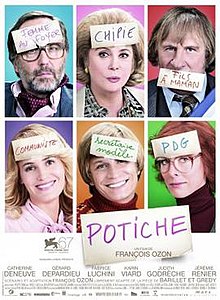Potiche
| Potiche | |
|---|---|

Theatrical release poster
|
|
| Directed by | François Ozon |
| Produced by | Éric Altmayer Nicolas Altmayer |
| Screenplay by | François Ozon |
| Story by | Pierre Barillet Jean-Pierre Grédy |
| Starring |
Catherine Deneuve Gérard Depardieu Fabrice Luchini Karin Viard Judith Godrèche Jérémie Renier |
| Music by | Philippe Rombi |
| Cinematography | Yorick Le Saux |
| Edited by | Laure Gardette |
|
Production
company |
Mandarin Cinéma
Production Services Belgium |
| Distributed by | Mars Distribution |
|
Release date
|
|
|
Running time
|
99 minutes |
| Country | France Belgium |
| Language | French |
| Budget | $11.2 million |
| Box office | $28.8 million |
Potiche is a 2010 French-Belgian comedy film directed by François Ozon, based on the play of the same name by Pierre Barillet and Jean-Pierre Grédy. It stars Catherine Deneuve, Gérard Depardieu, Fabrice Luchini, Karin Viard, Judith Godrèche and Jérémie Renier. Set in 1977, the film tells the story of a submissive wife who gets to run her husband's umbrella factory, after the employees rebel against their tyrannical manager. In French, a "potiche" is a decorative vase, but by extension means "window dressing" or, roughly, "trophy wife". The film competed at the 67th Venice International Film Festival and received two Magritte Award nominations, winning Best Supporting Actor for Jérémie Renier.
François Ozon saw the play Potiche by Pierre Barillet and Jean-Pierre Grédy about ten years before he made the film. According to Ozon, the genesis of the film version was, partly, that he had been approached by the producers Éric and Nicolas Altmayer and asked to make a biographical film about Nicolas Sarkozy, and, partly, his experiences from the 2007 presidential campaign, where he followed the Socialist Party's candidate Ségolène Royal. While writing the screenplay, Ozon regularly met with Barillet, who gladly approved the tweaks made in order to enhance the story's relevance for contemporary society. The 1970s setting was, however, retained; this was both because the distance allowed the director to make a more humorous film, and because France was more politically divided in the 1970s, which made the class relations more remarkable. The political career of Suzanne was entirely Ozon's own addition to the story, which in its original incarnation ended when Robert returns to the factory.
...
Wikipedia
